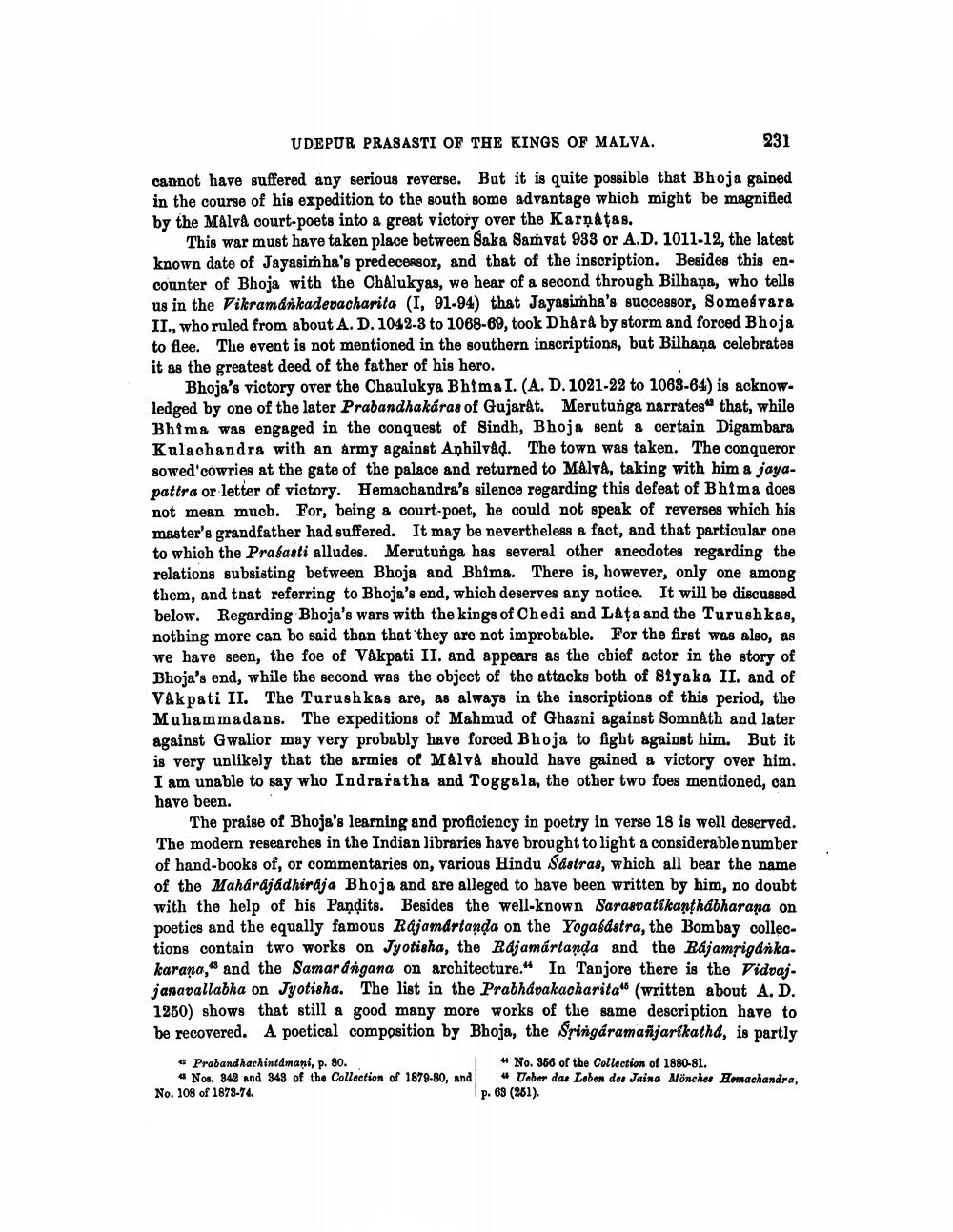________________
231
UDEPUR PRASASTI OF THE KINGS OF MALVA.
cannot have suffered any serious reverse. But it is quite possible that Bhoja gained in the course of his expedition to the south some advantage which might be magnified by the Malva court-poets into a great victory over the Karnatas.
This war must have taken place between Saka Samvat 933 or A.D. 1011-12, the latest known date of Jayasimha's predecessor, and that of the inscription. Besides this encounter of Bhoja with the Chalukyas, we hear of a second through Bilhana, who tells us in the Vikramánkadevacharita (I, 91-94) that Jayasimha's successor, Somesvara II., who ruled from about A. D. 1042-3 to 1068-69, took Dhårå by storm and forced Bhoja to flee. The event is not mentioned in the southern inscriptions, but Bilhana celebrates it as the greatest deed of the father of his hero.
Bhoja's victory over the Chaulukys Bhima L. (A. D. 1021-22 to 1068-64) is acknow. ledged by one of the later Prabandhakáras of Gujarat. Merutunga narrates that, while Bhima was engaged in the conquest of Sindh, Bhoja sent a certain Digambara Kulachandra with an army against Anhilvâḍ. The town was taken. The conqueror sowed'cowries at the gate of the palace and returned to Malva, taking with him a jayapattra or letter of victory. Hemachandra's silence regarding this defeat of Bhima does not mean much. For, being a court-poet, he could not speak of reverses which his master's grandfather had suffered. It may be nevertheless a fact, and that particular one to which the Prasasti alludes. Merutunga has several other anecdotes regarding the relations subsisting between Bhoja and Bhima. There is, however, only one among them, and that referring to Bhoja's end, which deserves any notice. It will be discussed below. Regarding Bhoja's wars with the kings of Chedi and Lâța and the Turushkas, nothing more can be said than that they are not improbable. For the first was also, as we have seen, the foe of Våkpati II. and appears as the chief actor in the story of Bhoja's end, while the second was the object of the attacks both of Siyaka II. and of Vakpati II. The Turushkas are, as always in the inscriptions of this period, the Muhammadans. The expeditions of Mahmud of Ghazni against Somnath and later against Gwalior may very probably have forced Bhoja to fight against him. But it is very unlikely that the armies of Malva should have gained a victory over him. I am unable to say who Indraratha and Toggala, the other two foes mentioned, can have been.
The praise of Bhoja's learning and proficiency in poetry in verse 18 is well deserved. The modern researches in the Indian libraries have brought to light a considerable number of hand-books of, or commentaries on, various Hindu Sastras, which all bear the name of the Mahárájádhiraja Bhoja and are alleged to have been written by him, no doubt with the help of his Pandits. Besides the well-known Sarasvatikanthábharapa on poetics and the equally famous Rájomártonda on the Yogaídstra, the Bombay collections contain two works on Jyotisha, the Rajamartanda and the Rájamrigánka. karana, and the Samarángana on architecture." In Tanjore there is the Vidvaj janavallabha on Jyotisha. The list in the Prabhavakacharita" (written about A. D. 1250) shows that still a good many more works of the same description have to be recovered. A poetical composition by Bhoja, the Sringáramañjarthatha, is partly
"Prabandhachintamani, p. 80.
Nos. 342 and 343 of the Collection of 1879-80, and No. 108 of 1873-74.
No. 356 of the Collection of 1880-81.
"Ueber das Leben des Jaina Mönches Hemachandra, p. 63 (251).




